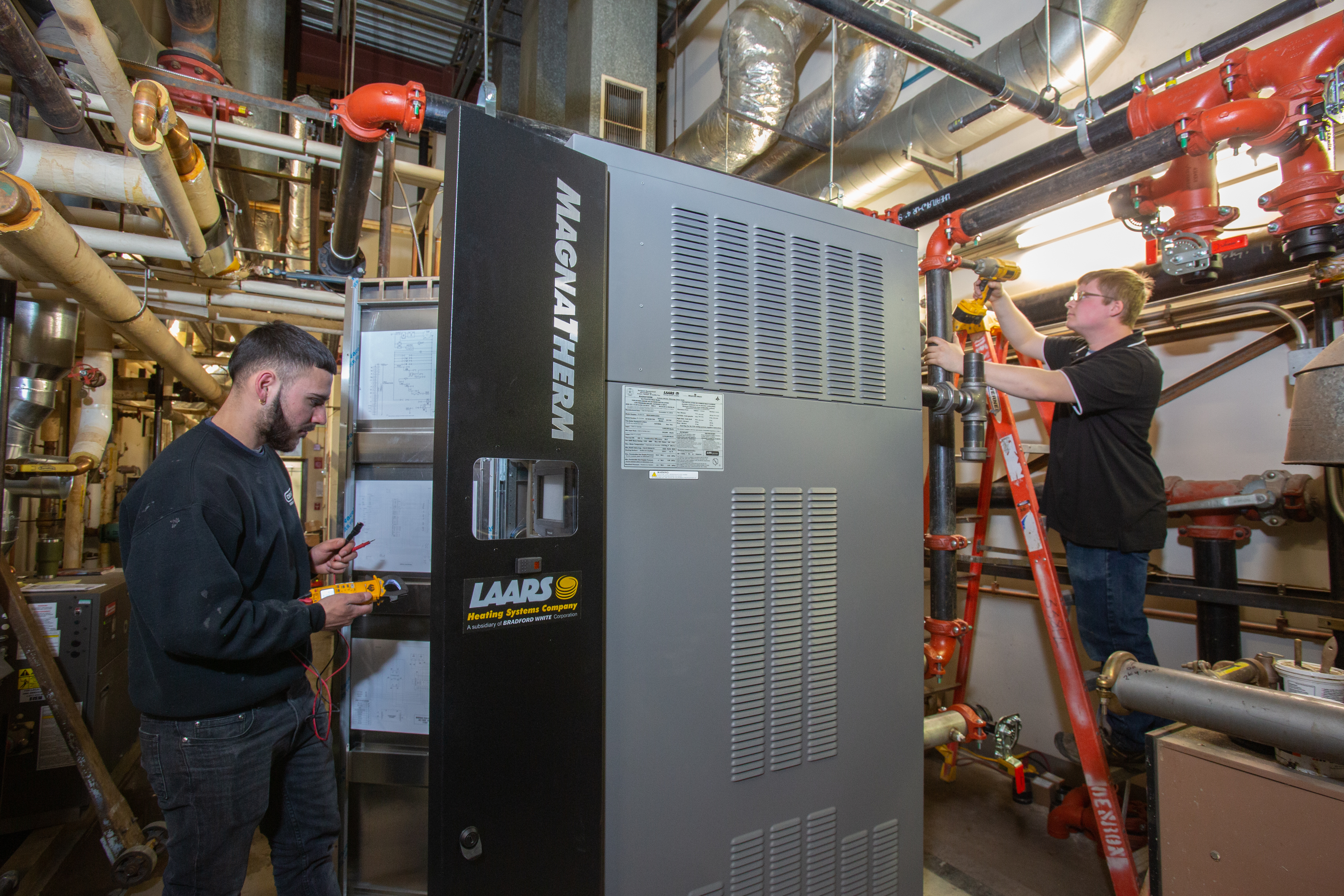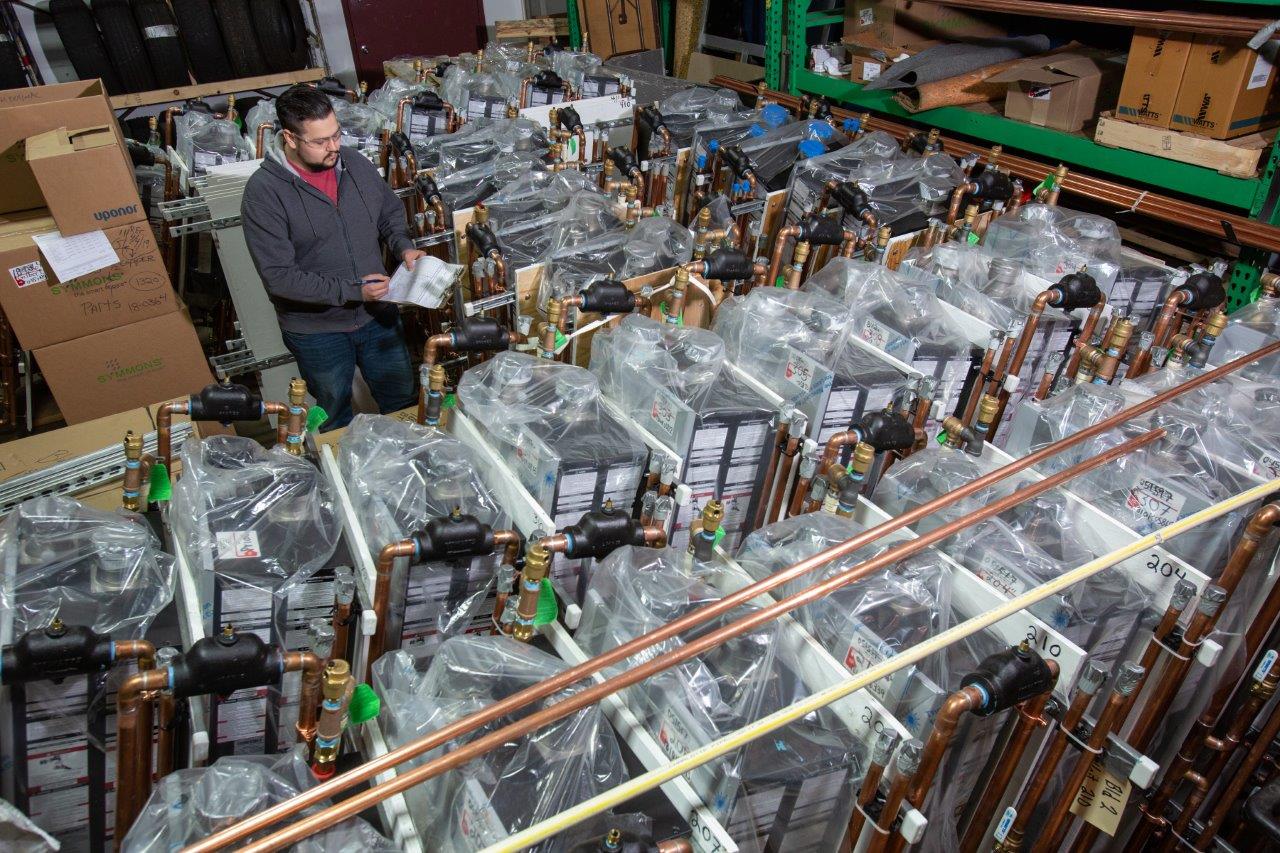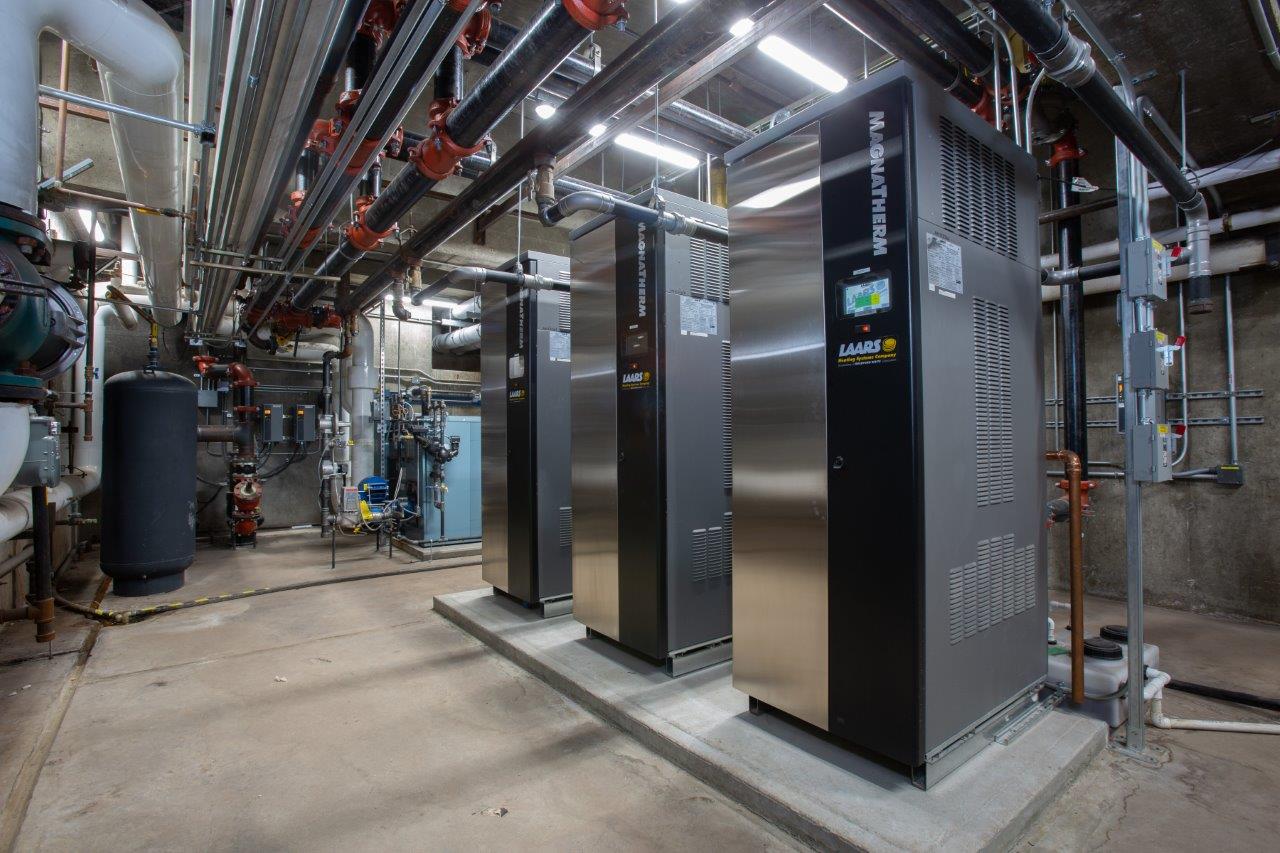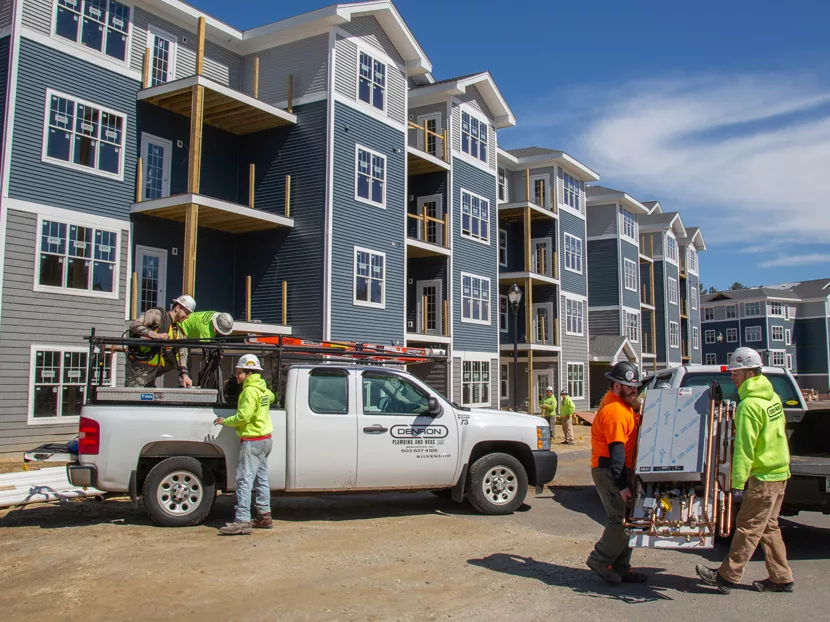Denron Plumbing and HVAC LLC, a merit shop with about 150 employees based in Manchester, New Hampshire, chose its commercial/industrial plumbing and mechanical path decades ago. For more than 40 years, Denron has served the New England market with a “quality first” mantra that every employee understands.
“It’s a way of life, and it’s served us well,” says Joel Pickering, MBA, company partner and president, who started with Denron as an estimator 14 years ago.
The plumbing and HVAC firm provides complete plumbing and HVAC services, design-build, installations, plus service contracts for a variety of markets, including the full gamut of commercial, residential, education, hospitality, healthcare and manufacturing. And if that wasn’t enough, Denron also offers BIM and pre-fabrication services.
Mission statement
The company’s mission statement states: “To provide our clients with value-added services, knowledge and support, which ensures that every project is a success.”
Denron’s commitment to its clients is to complete projects on time and on budget, all while providing customers with quality and great customer service.
If it’s a promise to be taken seriously – and Denron managers do – customers or potential customers might understandably want to know how the contractor is able to deliver high-quality project completions on budget and on time.
The answer lies in Denron’s vigilance to foresee challenges and to fix them before they evolve into problems, staying current with the latest construction and mechanical technology, materials and training.

Managers also attribute their success to a dynamic company structure and the talent of engaged employees.
“We can take any project and usually we can find a way to reduce costs for the customer, and at the same time give them a better performing building,” Pickering explains. “That takes extreme talent; not many companies can replicate this.”
When Pickering talks about his company’s strength, and what helps Denron deliver, he says it comes down to adding value all along with way.
Added layer
“Most companies are set up in a way that the foreman and project manager are responsible for everything,” he says. “But at Denron we have an added layer of management: the production supervisor.”
This person’s role is responsible for coordinating the work in the field before it happens. This way a foreman can focus on getting the most out of his crew, and the project manager can focus on time, scope and cost.
“This formula really gives us an edge on active projects of any size,” Pickering explains. “The project manager handles the administrative side of things, and the project supervisor coordinates the job, orders materials, schedules manpower and irons out all the wrinkles.”
This way, Denron crews out in the field don’t have to stop to second-guess or, worse, do something twice.
“That’s where the rubber meets the road at Denron,” Pickering says.
Each team member at Denron is a specialist. Some employees only do cost estimating, some do engineering exclusively, and some are focused solely on project management. There’s also a separate fabrication shop and purchasing department.
In addition, Denron takes safety very seriously. Safety is a decidedly integrated part of Denron’s culture, Pickering says, with everyone vigilant about their own safety and other employees’ safety.
The company, a member of the Associated Builders and Contractors, Inc., received an award from the association last year for its innovative safety program, which awards points for safe practices that employees can redeem for tools and merchandise.
At press time, Pickering told us that as of Dec. 12, Denron was at 538 days without a lost time injury.
“Having such a stretch without a lost time injury takes an incredible amount of effort from everyone on the team,” Pickering adds. “They need to hold each other accountable when they see someone doing something unsafe. Our senior guys do a great job of showing apprentices the best practices for working safely and efficiently.”
Paying it back
Besides producing high-quality projects and ensuring everyone is safe, Denron gives back to the community and the plumbing and HVAC industry. The company has the largest plumbing apprenticeship program in New Hampshire and is involved in workforce development initiatives.
For example, Denron participates in the ACE (Architecture, Construction and Engineering) Mentor Program of America, a free, award-winning afterschool program designed to attract high school students to pursue careers in the building and design industry. Denron has committed to fund an ACE scholarship fund introduced last year for the next five years.

A local institute that offers more than 60 associate degree and certificate programs, also has an active alumnus in Pickering, too.
Not only does he sit on Manchester Community College’s HVAC advisory board, he taught as an adjunct professor for two years. Denron also made a donation in 2017 that helped construct a new lab building on the campus.
“Now that I’m involved with the community college I went to in the 1990s,” he adds, “I want to give back to some of the programs that helped me get a foothold when I was starting my career.”
In addition to Pickering, Denron’s management team is made up of Michelle Delois, CFO/CPA; Joe Bellefeuille, senior vice president of sales; Jeff Warren, partner/senior vice president of operations; Norm Roy, senior vice president of production; Steve Bienvenue, partner/project manager; Joseph Nash, partner/production supervisor; Christopher Mitchell, partner/small project manager; Greg Ross, sales manager; James Clogston, estimator; Greg Webster, controller; and Troy Edmunds, production supervisor.
Denron’s six partners have a combined 101 years of experience in the industry.
“Leading a contracting firm with a good name and deep history isn’t easy,” Pickering says. “The expectations that we place on ourselves, and the standards our clients place on us are very high.”
But Pickering adds everyone at Denron loves rising to the challenge of being the best of the best.
“For Denron to maintain its position in the New England marketplace, we must constantly adapt and evolve,” Pickering says. “While construction segments in our area shift, it’s my job with the help of our management team to position Denron to best capture the available work. Integrating new technology and products help us to deliver what our clients expect. But regardless of what type of construction or service work is available in our market, our secret ingredient has and always will be the talent of our people.”
Denron crews don’t have to travel too far to complete some its big jobs. Right in its hometown, the company completed a mechanical overhaul at a 17-story luxury apartment complex and is currently retrofitting the Currier Art Museum’s mechanical systems.
For most of its jobs, Denron experts work closely with the rep firms, Tower Hill Sales, which reps Laars and Emerson-Swan, which reps Taco.
Pickering says Denron views employees, subcontractors, suppliers, and manufacturers reps as true stakeholders in Denron.
“While they depend on us being successful for their continued business and good jobs,” he adds, “we count on them as well to help deliver good work for our clients.”
Brady-Sullivan Tower
Let’s see how this philosophy works out in another local job done at the Brady-Sullivan Tower. The 12-story office high-rise built in 1972 was recently remodeled and features prime professional suites minutes from downtown Manchester.
Building owners knew it was time to give the mechanical systems of this 212,000-square-foot building a facelift when one of the six 15-year-old 1.5 million BTU cast-iron boilers started to leak during the winter two years ago.
That’s when Denron got the call to oversee the retrofit. The contractor began the project’s heating plant upgrade in the summer of 2018.
Facility managers decided to scrap all the old boilers, so Denron replaced them with three, 3 million BTU Laars MagnaTherm II boilers, connected to the manufacturer’s Vari-Prime pumping package. Taco pumps, circulators and expansion tanks were used extensively, including the variable speed circs that came with the Laars boilers.

Heavy metal
As with any retrofit project, there were some challenges. The subterranean mechanical room itself is quite large, but gaining access to it was difficult because it’s located under the building’s front lawn. That left the only way into the mechanical room through the loading dock entrance, then down a long hallway with a doorway opening just 36-inches wide.
One of the toughest challenges was removing the old boilers and rigging the new boilers into the space. The six old boilers were cast-iron sectionals, each with 12 sections that weighed in at about 300 pounds apiece. That’s a lot of iron.
“To remove the sections, and also avoid going up the stairs,” says Christopher Mitchell, Denron partner and small project manager, “we had to hand truck each one up the steel ramp we constructed, and from there, out of the newly remodeled hallway of the building,”
The just-completed hallway was also pristine so Denron pros had to be sure it stayed that way.
“We protected it with a layer of plastic and a layer of plywood over the top of the plastic to ensure that the walls and newly laid carpeting were kept clean and blemish-free,” Mitchell says. “Then we hauled away the sections of the boilers to the scrap yard. The demo work involved several days of hard labor.”
After the old boilers were completely removed, the three new boilers were brought into the mechanical room space, at least moving with gravity. It was another not-so-easy task, but nothing on a scale equal to those old cast-iron sections, moving against gravity’s pull.
“The boilers wouldn’t quite fit through the doors and down the ramp and into the space,” Pickering explains. “Our crews were glad to have the standard knock-down capability for disassembly – an important part of the specification – allowing the boilers to pass through 36-inch doors, and were then reassembled on concrete pads.”
Technicians understood the importance of careful disassembly of the boilers and, to be sure, bagged and labeled each part.
“Every individual wire, plug and rack was labeled, so the team could reassemble each unit in place,” Mitchell adds. “It was quite an effort to disassemble and reassemble all three boilers. But it was made much easier than it could have been thanks to the boilers’ knock-down feature, so we got the hang of it soon enough.”
Flue piping
Another challenge the Denron team encountered on the project was the flue piping. With the boilers located under the front lawn of the building, crews had to run new CAT IV flue piping through a chase alongside the old stack, which is still in use for a standalone steam boiler reserved for domestic hot water.
“The new, concentric flue piping terminated outside on the front lawn and in such a way that it didn’t look too unappealing,” explains Jarrett Pimenta, one of Denron’s lead boiler technicians. “The flue material was large enough that it was all special order, so our layout and construction needed to be perfect. We couldn’t allow the project to be held up because we were missing a single piece.”
Denron pros also replaced that old steam boiler and needed to keep downtime to a minimum. Piping for the new steam boiler was completed with Victaulic’s new rigid couplings for saturated steam systems, pumps and other components from Taco, including the variable speed OEM circs that came with the Laars boilers.
Among the key advantages that Denron brought to bear for the facility was the Vari-Prime pumping package that came with the MagnaTherm boilers. According to Pickering, the Vari-Prime is a variable control package that maintains a user-chosen temperature rise between the inlet and outlet of the boiler – carefully matching load to boiler output, greatly improving performance and efficiency.
The new boilers were operational around the middle of October. However, there were other punch list items that weren’t completed until later that winter.
“We got the boilers up and running and finalized programming for operation in the fall,” Pickering says. “That was a necessity with the coming of winter months. We finished insulating the pipe through December to February, along with an assortment of odds and ends.”
Just like most of its retrofit projects, Denron experts designed and built the new mechanical system for the Brady-Sullivan facility.
“It’s not too common to have a retrofit commercial-size boiler job without an engineer,” Pimenta explains. “But in this case, it worked out just fine.”
According to Reid Goodrich, Emerson Swan’s outside sales rep for New Hampshire, three variable-speed OEM Taco pumps were installed as part of the Vari-Prime pumping package for the boilers.
Eric Corum, Tower Hill Sales, was tapped to help with system design and product selection and specification.
“We’re always eager to work with Denron,” Corum says. “They’re the consummate pros. On this job, the unique aspects were the two-pressure zone system because of the big plate-and-frame heat exchanger, and the amount of boiler energy going through the door – the three large MagnaTherms now installed and working flawlessly.”
Pickering adds: “After seeing what equipment was in this building before we started, it’s impressive to go back into the mechanical room now. The room is much cooler, probably by 20 degrees, which is a testament to the reduced standby losses of the new boilers.
“When the boilers are operational, it’s so quiet,” he added. “You can check the drive on the Vari-Prime pumps, and look at the firing rate on the boiler display – the systems are just purring along. It’s a big improvement from the old on-off power flame burners and the big old draft inducer fan that used to be in there. The maintenance of the plant is now easier as well, because we cut the plant down from six pieces of equipment to three. I’m really proud of our guys; they hit this one out of the park.”






